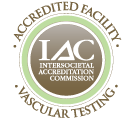What is Deep Vein Disease?
One of the most common types of diseases afflicting blood vessels is deep vein disease. While varicose veins are the most common result of this type of disease, there are other, more serious complications that can arise if left untreated. Venous ulcers, for example, form when deep vein disease is not taken care of in a timely manner. These can cause permanent injury to the tissue of your legs and may create chronic, non-healing wounds.
Treatment, unfortunately, is still relatively undeveloped, but over the past 10 years, new and exciting treatments have become available.
At The Vascular Experts, we have been treating these types of diseases since 2007 and we are recognized as an industry leader. As of right now, we are running three multicenter prospective clinical trials to help us study these diseases and treatments so that we can create more refined, effective treatment plans for future patients.
Understanding Deep Vein Disease
Deep vein disease occurs when the veins and small valves of those veins become defective. When valves no longer work as they should, blood flows backward toward the foot – also known as reflux. To compensate for these valves, the larger deep veins of the leg begin to expand to help bring blood back up to the heart – forcing their valves to no longer close properly. The result is varicose veins.
As the deep veins no longer pump blood effectively, the legs can suffer from edema, skin changes or venous ulcers.
Depending on the severity of deep vein disease, a patient could suffer from multiple symptoms including:
• Swelling in the legs
• Heaviness of the legs
• Pain or cramps in the legs
• Discoloration of the lower leg
• Eczema
• White atrophy
• Open wounds, known as venous leg ulcers
What Causes Deep Vein Disease?
There are many reasons why a person can get deep vein disease and unfortunately, the main cause is not yet identified. There are, however, risk factors that may make you more likely to develop deep vein disease, such as:
• Genetic history
• Gender (women are more affected than men)
• Pregnancy
• Age
• Profession
• Obesity
• Other conditions, such as pelvic cancer, pelvic surgery or DVT (deep vein thrombosis)
What Are Your Options?
Patients often suffer from the effects of deep vein disease without ever realizing they have it. There are treatment options available that can help reduce your symptoms and let you return to a normal life. The team at The Vascular Experts has been refining treatments for years, offering our patients a wide range of options.
Learn more about our treatments by contacting The Vascular Experts today. Schedule a consultation at any one of our Connecticut locations.
Paul J. Gagne, MD, FACS, RVT
Paul J. Gagne, MD, FACS, RVT is a board certified general and vascular surgeon at The Vascular Experts, where he specializes in vascular and endovascular techniques for the treatment of arterial and venous disease. His particular areas of interest include the endovenous repair of abdominal aortic aneurysms, treatment of carotid disease and venous disease including varicose veins, deep vein thrombosis and chronic ulcers, and peripheral artery disease.
Dr. Gagne received his medical degree from The New York University School of Medicine. He then completed his internship and residency in general surgery at The New York University School of Medicine. Dr. Gagne is a Fellow of the American College of Surgeons and a Distinguished Fellow of the Society of Vascular Surgery. He is also a member of The Society of University Surgeons, The Eastern Vascular Society, The Peripheral Vascular Society, The American Venous Forum, The Military Vascular Surgery Society, The New York Vascular Society, The Society of Vascular Technologists and The American Registry of Diagnostic Medical Sonographers.
Please contact Dr. Gagne at PGagne@TheVascularExperts.com with any additional questions



